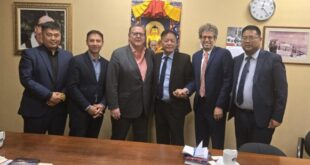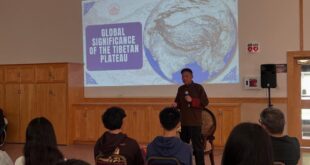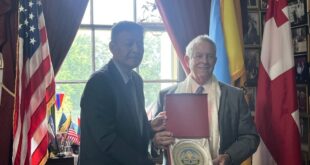Long Beach, April 21—His Holiness the Dalai Lama left San Diego on April 20, 2012 morning arriving in Long Beach a little after 8:00 am to continue with his visit to Southern California. The Abbot of Gaden Shartse, Jangchup Choeden, and officials of the Gaden Shartse Thubten Dhargye Ling Center, the host of his visit, received him at the airport.
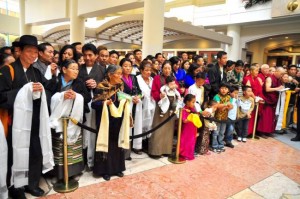
At the hotel, members of the Tibetan community inSouthern Californiaas well as of the GSTDL Center had gathered to receive him. Before a gathering of the press, the Mayor of Long Beach City, Bob Foster, welcomed His Holiness and announced that a tree will be planted in Long Beach in his honor. Then State Senator Lou Correa informed His Holiness of how he had read many of his books as a young boy and admired his thoughts. The Senator also presented to His Holiness a plaque of appreciation as a humble symbol of the people of Orange County, in which Long Beach is located.
In his remarks to the press, His Holiness said wherever he went he talked about his two commitments of promoting human values and promoting religious harmony and understanding. He said at the human level he was no one special and the same as any other human being. He believed that man being a social animal; an individual’s interest depends on that of the rest of the world. He said the basic human nature is that of compassion, and being gentle. He said there was the need to create awareness of the fact that the ultimate source of a successful life and a happy life is within us.
He said his number two commitment related to religion. He said all the major world religious traditions have different approach, but the essential message is the same, i.e. the practice of love, tolerance, contentment, etc. Talking about the service of the religious community to society, His Holiness said Christians have made the greatest contribution in the field of education and health. However, only in the past, even today, religion sometimes causes division.
His Holiness then referred to the situation inIndiawhere he said even a child understands the co-existence of the different religious traditions there. Talking about respecting other religious traditions, His Holiness recalled an Australian Christian leader who introduced him as being a good Christian at a public meeting. His Holiness said he had in turn called the Reverend a good Buddhist. His Holiness said that he believed he has been able to make a small contribution in promoting inter religious harmony.
His Holiness said previous he had his third commitment concerning Tibet, but since 2001 after having an elected leadership they took major decisions and his position became that of being semi retired. He said in 2011 the term of the elected leader ended and elections took place. He said he observed the active involvement of the Tibetan community in the process and thought about devolving his political authority so that he could have complete retirement. Subsequently, onMay 29, 2011 he had signed a legislation handing over the political authority to the elected leadership. Therefore, in certain matters, he said he was now freer.
His Holiness said the reason he mentioned these issues is because he felt the media also had a role in creating awareness about them. Emphasizing that the media had a special role His Holiness repeated his assertion that the media should have a long nose like an elephant that can smell not only in the front but also in the back. He said the media should point out if religious people were acting hypocritically and do not practice properly. He said the case was similar with politicians, pointing to the Long Beach Mayor and the State Senator present in the room.
A journalist asked how should the media maintain a balance when the people seem to want bad news. His Holiness said while reporting bad news the media could also highlight the potential of hope. He added that tragic news could also be an opportunity to introduce care. He felt that the reason why the Buddha taught suffering as the first of the four Noble truths was not to demoralize the people. Rather, he said that if people realize suffering then naturally nobody wants to suffer and so will look for a remedy.
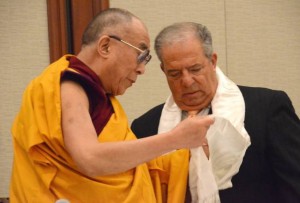
In response to a question about cultivating a peaceful mind, His Holiness talked about the connection between the mind and the body. He said the mental system, like the physical in that if the basic health condition is weak then even small viruses can affect it. He said therefore there was the need to build a healthy mental state, in the form of moral ethics. He said doing this through a religious approach makes it limited and creates borders. He talked about the age-old tradition of secularism inIndiawhere there is respect for all religious believers as well as non-believers. He felt this could be promoted through common experience, by using common sense and looking at scientific findings. His Holiness said these days scientists are beginning to feel that emotion is important and that a calm mind was helpful for good health. His Holiness recalled attending a conference in San Francisco on youth violence the conclusion of which was that this came about on account of a lack of affection.
His Holiness talked about incorporating the study of moral ethics in the education system and said in the next few years we will develop a plan on how to do this.
The next question was the news from Tibet about yet another two Tibetans having committing self-immolations and how His Holiness saw the overall issue of self-immolations inTibet. His Holiness said that the development was very sad. The issue is very political. However, he said soon after the first such incidents he was in Japan and had then called for the concerned people to do a thorough investigation into the real cause. He talked about incidents of self-immolation inVietnamandChina, too, where during the Cultural Revolution an abbot of a monastery had committed self-immolation when the Red Guards were trying to destroy the monastery. His Holiness also recalled visiting the site of a self-immolation by Jan Palach, a student in Czechoslovakia.
His Holiness said there were some who feel that the self-immolations have occurred all of a sudden. He said it was not so and that it was directly related to more than two decades of policies by local Chinese authorities. The tightening of control in monasteries and schools (one hard lined Chinese Party Secretary banned the teaching of classical Tibetan text in Tibet University in Lhasa), effort to start political education in monasteries, etc. made some Tibetans say that there was a sort of semi Cultural Revolution taking place. He said further tightening of control and suppression has been the immediate cause of the 2008 demonstrations inTibet.
His Holiness also said in recent times the Chinese authorities have called for launching a war against “splittism” and asked if, as the Chinese claim, it is just “a handful of splittists” why would there be the need of a war? His Holiness said in the late 1950s there have been a lot of suffering in Tibet and a Chinese writer was coming out soon with a new book showing the finding that half a million Tibetans have been killed or died of torture.
He said Tibetans have our own language and culture, which are the sources of the Tibetan spirit. He said the Chinese leadership is targeting that.
His Holiness, however, said fortunately Chinese Prime Minister has been talking about the need for political reform, repeating the same during a press conference after this year’s National People’s Congress session. A few days after Wen’s statement, action was taken against the hardliner Bo Xilai. His Holiness said may be the open-minded leaders could be getting the upper hand.
To a question about the possibility of 15th Dalai Lama not being there, His Holiness joked about being asked this question inNewark. He joked that at that time he had removed his glasses, looked straight at the journalist who asked the question asking whether any hurry was needed by looking at his face. His Holiness mentioned a statement that he had issued in September 2011 outlining his thoughts on his reincarnation. He said Tibetan spiritual leaders have been meeting several times and during some meetings the issue of the Dalai Lama’s reincarnation has been raised. He said in his statement he had clarified that when he reaches around 89 or 90 years old he would convene a meeting of concerned people to decide whether the institution of the Dalai Lama should continue or not. He said actually he had said as early as 1969 that if the majority of the people feel that the Dalai Lama institution was not needed, it could end. He joked that it may not be a bad idea if the institution stopped when the 14th Dalai Lama is very popular.
Another journalist asked about North Korea and what His Holiness would do if he were invited to that country. His Holiness replied that if some serious and sincere invitation came he would consider that.
Thereafter, His Holiness went to the Long Beach Arena to perform the preparatory ritual for the Yamantaka Initiations. From there he addressed a gathering at a luncheon for supporters of the event and talked about the linguistic ability of Shartse Abbot Jangchup Choeden who can speak Hindi, English, Chinese, etc. His Holiness also talked positively about the late Geshe Tsultim Gyeltsen, the founder of Gaden Shartse Thubten Dhargye Ling Center, as a good scholar but also “a little bit naughty.” He said that Geshe Gyeltsen and Geshe Lhundup Sopa (inMadison) were among the top scholars. His Holiness said he had initially planned on bestowing the Yamantaka Initiation last year but had to cancel it after he was indisposed on his way here. Therefore, he had promised the Abbot that he would bestow it this time. His Holiness thanked the supporters of the event and joked that he was extending the thanks for the fund being raised by others.
In the afternoon, His Holiness conducted the Tagon (preliminary preparatory teachings) of the Yamantaka Empowerment. He gave a commentary on The Song of the Four Mindfulnesses, Causing the Rain of Achievements to Fall by the Seventh Dalai Lama.
Speaking about the Yamantaka empowerment His Holiness said he had received it first from Taktra Rinpoche, one of his tutors, and later from Ling Rinpoche (also his tutor). However, he had begun Yamantaka practice when he was quite young, mainly to improve the sharpness of mind. He added that people who did this practice saw changes within a short period of time.
His Holiness will bestow the initiations in the morning on April 21, 2012. In the afternoon, he will give a public talk, “Peace in Troubled Times.”

